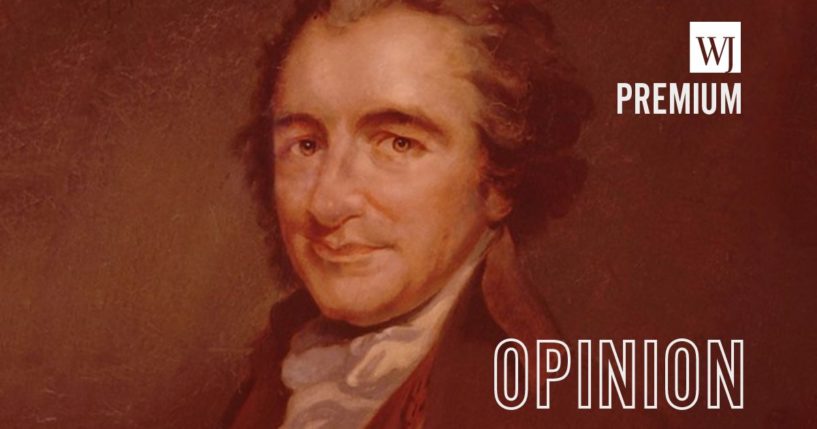
Thomas Paine's 'Common Sense' Turns 248 Years Old This Month - Its Stirring Words Are Extremely Relevant Today
Thomas Paine’s seminal political pamphlet “Common Sense” turns 248 years old this month.
It cannot be overstated how much impact the little 48-page writing arguing for American independence from Great Britain had on the 13 colonies.
The truths that Paine shared about government and tyranny are still relevant today.
Common Sense Sells
First published on Jan. 10, 1776, in Philadelphia, “Common Sense” quickly became an astounding success.
One hundred and twenty thousand copies were sold in the first three months, and the total reached 500,000 by the end of the Revolutionary War.
For a country with a population of about 2.5 million in 1776, that number was amazing. The National Constitution Center calculated that it would translate to 60 million copies sold today, based on the country’s current population.
Paine pledged that all of the proceeds from the sale of the pamphlet would go toward helping provision George Washington’s Continental Army, which had been in the field opposing the British in Massachusetts since the previous summer.
“Common Sense” remains in print to this day.
Thomas Paine, American Patriot
Paine arrived in America only months before hostilities broke out between the colonies and the crown, but he quickly came to believe in the cause of American freedom.
His life prior to coming to America had been riddled with disappointment and hardship, including professional failure and two short marriages.
When he stepped foot in Philadelphia in 1774 at 37 years old, he possessed little more than a letter of introduction from Benjamin Franklin, then a colonial ambassador to Great Britain.
Shortly after his arrival in the colonies, Paine was hired as editor of The Pennsylvania Magazine. The new immigrant wrote about politics and other issues.
At some point likely late in 1775, he turned his efforts to writing “Common Sense,” which he published anonymously.
The pamphlet is broken into four chapters: 1) the purpose of government, 2) the flaws of monarchy, 3) the present state of affairs between Great Britain and her 13 American colonies, and 4) the resources the colonies had in their war against the mother country.
Obviously, a good portion of what Paine wrote dealt with the circumstances of the time, but many of the principles he explained remain highly relevant now.
An Intolerable Evil
“Society in every state is a blessing, but Government, even in its best state, is but a necessary evil; in its worst state an intolerable one,” Paine wrote at the outset of “Common Sense.”
“For when we suffer, or are exposed to the same miseries by a Government, which we might expect in a country without Government, our calamity is heightened by reflecting that we furnish the means by which we suffer.”
One could argue that the invasion of illegal immigrants at the southern border is an example of the American people offering the means through their taxes by which they suffer at the hands of the Biden administration.
Over 10 million illegal aliens have arrived in the last three years, including so-called gotaways. They have poured into the nation’s cities, creating a housing crisis.
Further, the mass numbers of people have forced Border Patrol agents away from their mission of securing the border from the influx of illegal drugs, human traffickers and other criminal elements.
So the ultimate purpose of government of protecting the people is being undermined by the Biden administration.
Paine’s Biblical Basis
In his discussion of monarchies in Chapter 2 of “Common Sense,” Paine grounded most of his arguments against authoritarian rule in the Bible.
He noted that it was not God’s will for people to be ruled by kings, as seen in ancient Israel. God only allowed it because the ancient Israelites wanted to be like the other nations around them.
“Near three thousand years passed away, from the Mosaic account of the creation, till the Jews under a national delusion requested a king. Till then their form of government (except in extraordinary cases where the Almighty interposed) was a kind of Republic, administered by a judge and the elders of the tribes,” Paine wrote.
“Kings they had none, and it was held sinful to acknowledge any being under that title but the Lord of Hosts.”
Paine offered the example of Gideon, who after leading the Israelites to victory in battle refused to be made king. Instead, he became a judge.
“I will not rule over you, neither shall my son rule over you. THE LORD SHALL RULE OVER YOU,” Gideon told the people, which Paine capitalized for emphasis.
The pamphleteer cited God’s warning from the Bible of how kings would impose stiff taxes to pay for their bloated government and confiscate property to pay off their cronies.
21st-Century Tyranny
Biden has certainly made some king-like, unilateral moves without the approval of Congress, like canceling $136 billion in student loan debt that was owed the taxpayers.
His administration also attempted to extend a nationwide eviction moratorium so landowners could not remove people for failing to pay their rent. Meanwhile, those landowners had to maintain their properties and pay taxes and loans they may have taken out.
The Supreme Court struck down that power grab as unlawful.
Biden also sought to impose a COVID-19 vaccine mandate on most of the nation’s workforce, though the vaccine did not stop the spread of the virus and was still essentially in the experimental phase, with no way to know its long-term effects.
Again, the Supreme Court said this move exceeded his authority as president and overruled it.
The administration’s Justice Department is currently prosecuting Biden’s chief political foe, Donald Trump, the likely 2024 Republican presidential nominee.
Biden has also sought to demonize the entire Make America Great Again movement, as the FBI undertook the largest investigation in its history to round up even those who engaged in nonviolent protests at the Capitol on Jan. 6, 2021.
“In America the Law Is King”
Rather than the unilateral rule of a man or woman, Paine argued that the law should be king, not vice versa.
“But where, say some, is the King of America? I’ll tell you, friend, he reigns above, and doth not make havoc of mankind like the Royal Brute of Great Britain,” he wrote.
Paine urged that America should adopt a governing charter. “Let it be brought forth placed on the Divine Law, the Word of God; let a crown be placed thereon, by which the world may know, that so far as we approve of monarchy, that in America the law is king.”
“For as in absolute governments the King is law, so in free countries the law ought to be king; and there ought to be no other,” he added.
The charters adopted in the U.S. were, of course, the Declaration of Independence in 1776 and the Constitution in 1787.
Paine would go on to join the Continental Army. In December 1776, he penned the first in his “American Crisis” series, which famously opened, “These are the times that try men’s souls: The summer soldier and the sunshine patriot will, in this crisis, shrink from the service of his country; but he that stands it now, deserves the love and thanks of man and woman.”
“Tyranny, like hell, is not easily conquered; yet we have this consolation with us, that the harder the conflict, the more glorious the triumph,” he continued.
“What we obtain too cheap, we esteem too lightly: It is dearness only that gives every thing its value. Heaven knows how to set a proper price upon its goods; and it would be strange indeed, if so celestial an article as FREEDOM should not be highly rated.”
The truths contained in Paine’s “Common Sense” remain instructive to this day.
May Americans choose candidates this fall who will seek to uphold these American ideals.
Randy DeSoto is the author of “We Hold These Truths,” which is about the influence of the Declaration of Independence throughout American history.
Truth and Accuracy
We are committed to truth and accuracy in all of our journalism. Read our editorial standards.












